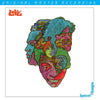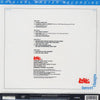



Love - Forever Changes (2LP, Ultra Analog, Half-speed Mastering, 45 RPM)
ORDER LIMITED TO ONE ITEM PER CUSTOMER
Arthur Lee – guitar, vocal
Bryan MacLean – guitar, vocal
Johnny Echols – guitar
Ken Forssi – bass
Michael Stuart-Ware – drums, percussion
Carol Kaye – bass guitar on "Andmoreagain" and "The Daily Planet"
Don Randi – keyboards on "Andmoreagain" and "The Daily Planet"; piano on "Old Man" and "Bummer in the Summer"; harpsichord on "The Red Telephone"
Billy Strange – electric rhythm guitar on "Andmoreagain" and "The Daily Planet"
Hal Blaine – drums on "Andmoreagain" and "The Daily Planet"
Neil Young – arranger on "The Daily Planet"[52]
David Angel – arranger, orchestrations
Strings – Robert Barene, Arnold Belnick, James Getzoff, Marshall Sosson, Darrel Terwilliger (violins); Norman Botnick (viola); Jesse Ehrlich (cello); Chuck Berghofer (string bass)
Horns – Bud Brisbois, Roy Caton, Ollie Mitchell (trumpets); Richard Leith (trombone)
2 LPs, gatefold sleeve
Limited numbered edition
Original analog Master tape : YES
Half-speed Mastering
Gain 2™ Ultra Analog
Heavy Press : 180g
Record color : black
Speed : 45RPM
Size : 12”
Stereo
Studio
Record Press : RTI
Label : MOFI
Original Label : Elektra
Recorded June 9 – September 25, 1967 at Sunset Sound Recorders, Hollywood, California
Engineered by Bruce Botnick
Produced by Arthur Lee, Bruce Botnick
Remastered by Krieg Wunderlich
Originally released in 1967
Reissued in 2016
Tracks:
Side A :
- Alone Again Or
- A House Is Not A Motel
- Andmoreagain
Side B :
- The Daily Planet
- Old Man
- The Red Telephone
Side C :
- Maybe The People Would Be The Times Or Between Clark And Hilldale
- Live And Let Live
- The Good Humor Man He Sees Everything Like This
Side D :
- Bummer In The Summer
- You Set The Scene
Awards:
Rolling Stone 500 Greatest Albums of All Time - Ranked 180/500
Rolling Stone 500 Greatest Songs of All Time - "Alone Again Or" - Ranked 442/500
Mojo: The 100 Greatest Albums Ever Made 11/100 - (1995)
1000 Recordings you must hear before you die - Ranked 87
Stereophile Records To Die For - 2007
Reviews :
"Love's Forever Changes made only a minor dent on the charts when it was first released in 1967, but years later it became recognized as one of the finest and most haunting albums to come out of the Summer of Love, which doubtless has as much to do with the disc's themes and tone as the music, beautiful as it is. Sharp electric guitars dominated most of Love's first two albums, and they make occasional appearances here on tunes like "A House Is Not a Motel" and "Live and Let Live," but most of Forever Changes is built around interwoven acoustic guitar textures and subtle orchestrations, with strings and horns both reinforcing and punctuating the melodies. The punky edge of Love's early work gave way to a more gentle, contemplative, and organic sound on Forever Changes, but while Arthur Lee and Bryan MacLean wrote some of their most enduring songs for the album, the lovely melodies and inspired arrangements can't disguise an air of malaise that permeates the sessions. A certain amount of this reflects the angst of a group undergoing some severe internal strife, but Forever Changes is also an album that heralds the last days of a golden age and anticipates the growing ugliness that would dominate the counterculture in 1968 and 1969; images of violence and war haunt "A House Is Not a Motel," the street scenes of "Maybe the People Would Be the Times or Between Clark and Hillsdale" reflects a jaded mindset that flower power could not ease, the twin specters of race and international strife rise to the surface of "The Red Telephone," romance becomes cynicism in "Bummer in the Summer," the promise of the psychedelic experience decays into hard drug abuse in "Live and Let Live," and even gentle numbers like "Andmoreagain" and "Old Man" sound elegiac, as if the ghosts of Chicago and Altamont were visible over the horizon as Love looked back to brief moments of warmth. Forever Changes is inarguably Love's masterpiece and an album of enduring beauty, but it's also one of the few major works of its era that saw the dark clouds looming on the cultural horizon, and the result was music that was as prescient as it was compelling." AllMusic Review by Mark Deming
Ultra Analog™ : The GAIN 2 Ultra Analog™ Series stems from the use of the Gain 2 system, mastered at half speed from the original master tapes where possible, capturing and uncovering as before undiscovered sonic information.
Half-speed mastering. In half-speed mastering, the whole process is slowed down to half of the original speed. A typical 33 1/3 rpm record is cut at 16 2/3 rpm. The source material is also slowed down (reducing the pitch in the process) meaning the final record will still sound normal when played back. Slowing the whole process down allows more time, which means the end result sounds better and is more efficient — allowing engineering to minimize the effects of inherent limitations within the vinyl format. The result is a more accurate and more open high-frequency response in the half speed vinyl when compared with a normal speed recording.
Ratings :
AllMusic : 5 / 5 , Discogs : 4,63 / 5





